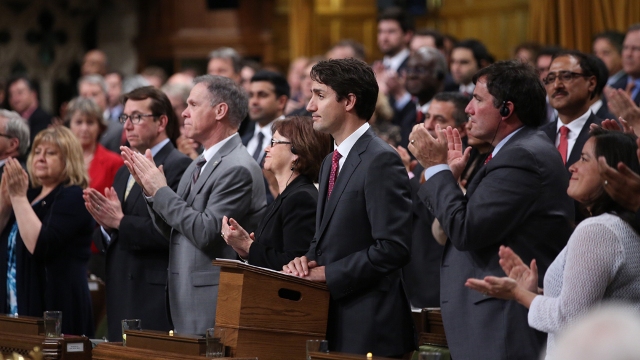
Carbon tax divides nation: Trudeau announcement sparks walkouts, ultimatums
by Cleantech Canada Staff, with files from The Canadian Press

Federal plan would set carbon floor price at $50 a tonne by 2022, but four Canadian provinces are already pushing back against tax

Justin Trudeau announced the national carbon tax in the House of Commons in earlier this week. PHOTO: Government of Canada
CALGARY—The field is set and the players are setting up their camps.
Prime Minister Justin Trudeau took to his feet in the House of Commons earlier this week to announce a national carbon tax that will force provinces to put a minimum price on carbon or set up a cap and trade system to tax emissions.
Designed to address climate change and ensure all regions of the country are paying for their greenhouse gas emissions, the announcement sparked walkouts from a climate meeting in Montreal, demands for pipeline quid pro quo, as well as a number of endorsements and shows of support.
The federal plan calls for a $10-per-tonne floor price starting in 2018, eventually rising to $50 a tonne in 2022—two-thirds higher than what Alberta’s price will be in 2018. Trudeau said the federal government will implement a price in any province or territory that doesn’t have either a carbon price or a cap-and-trade system in place by 2018.
Take an in-depth look: five things to know about Trudeau’s carbon price
Immediately after the announcement, which Saskatchewan Premier Brad Wall called a “betrayal,” the prairie province, Newfoundland and Labrador, Nova Scotia and Alberta had all but joined the opposing camp.
Alberta Premier Rachel Notley said her government may not have the legal power to stop Ottawa from imposing the plan, but warned the Trudeau government against pressing ahead without having the provinces on side.
“The federal government will struggle if they don’t have a willing partner in the provinces,” Notley told reporters Tuesday in Calgary.
“We’re happy to be that willing partner if they do what Albertans have done for Canada for many, many years, which is do their fair share.”
Notley has said she supports the idea of a common national carbon price in principle, but not without meaningful progress on building new market-opening infrastructure—in other words, a pipeline.
“At the end of the day, they would much prefer to adopt a more refined, collaborative, strategic approach that understands the realities of each part of the country. And I expect that that’s where they’d like to land,” she said.
Meanwhile, the federal government may face even tougher opposition in Saskatchewan and Atlantic Canada. Along with assertions from Wall, Nova Scotia Premier Stephen McNeil dug in Tuesday, saying outright that the province “definitely won’t” impose a carbon tax.
On the other side of the issue, the Liberal government plan has received a number of ringing endorsements, including from a high-profile group of business executives.
Even before Monday’s announcement Trudeau was facing backlash from both sides of the debate. The federal NDP said he was not doing enough to push the climate change agenda forward despite commitments made in Paris last year, while the Conservatives characterized the still-to-be unveiled carbon tax as a “cash grab” and a piece of job-killing legislation.
Despite the fresh dissent from large pockets of the country, the majority of Canadians support a national price on carbon, according to a recent poll.
—With files from Lauren Krugel, Bruce Cheadle, Keith Doucette, Sue Bailey and Kevin Bissett of The Canadian Press